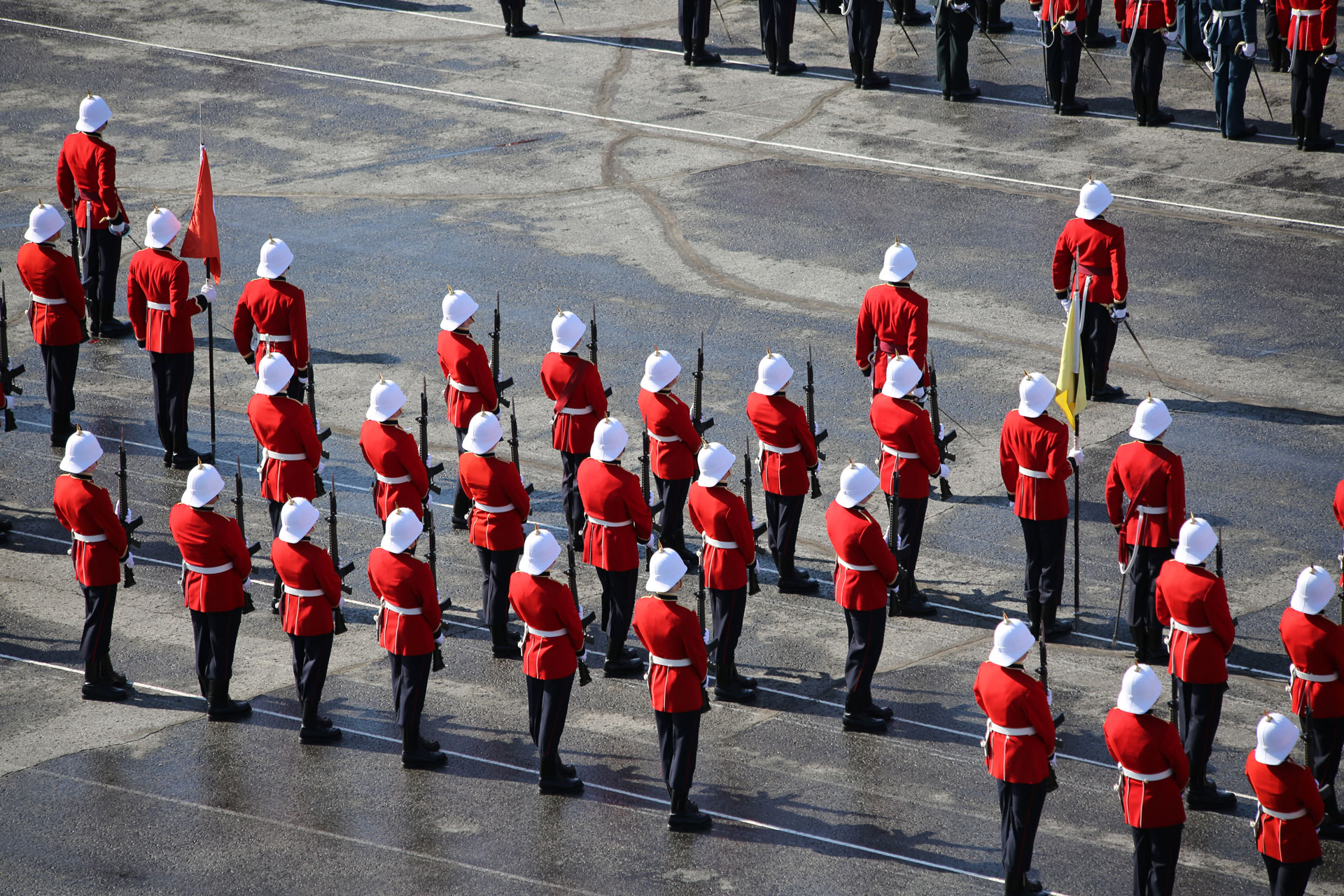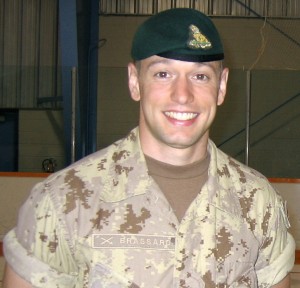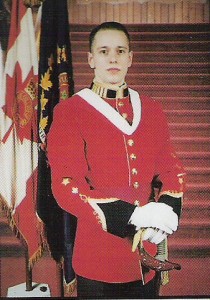
21614 Captain David Brassard: RMC Adjudant
21614 Captain David Brassard is a former RMC, five bar Cadet Wing Commander (CWC) – Class of 2000. For anyone, familiar with the college, the Adjutant position is one of the most demanding jobs available within the Military Wing.
Bill Oliver recently had the privilege to sit down and discuss some of the important aspects of his position within the Military Wing of the Royal Military College of Canada.
Q. Tell us a little about yourself. Where are you from? When did you attend RMC? Where were you posted prior to your current position?
A. Hometown is Montreal, QC. I joined the CF in June 1995 from Montreal. I spent a year in St-Jean then joined RMC in Sept 96. Graduated from RMC in 2000 with a Bachelor in Political Science and Economics First Class Honours. My MOC is Artillery Offr 22A. College number is 21614.
Q. When did you arrive at RMC as an officer? What position(s) did you hold prior to the Adjutant job?
A. I was posted to RMC in the summer 2007 directly from 2 CMBG Headquarters where I was employed as the Executive Assistant to the Brigade Comd. Prior to my assignment to Brigade Headquarters I spent close to 6 years in 2 RCHA in Petawawa: mostly in F Battery. I served as a Troop Commander, Forward observer, Forward Air Controller and Battery 2IC during those years. I was also lucky to be sent on tour three times: once in Bosnia and twice in Afghanistan so I arrived at RMC with a rather extensive operational background.
Prior to be the adjutant I served as 6 Sqn Comd for close to a year as well as the Sandhurst team OIC.
Q. You are an ex cadet – what are a couple of memorable moments from your cadet days?
A. Three vivid memories come to my mind from my time at RMC. The first one was the death of a fellow Cadet, Kleon Sproule, in the Fall of 99. That event certainly affected the entire fourth year class and we still remember him. I also clearly remember my recruit camp, back in August, September and October 1996 and how hard I thought it was compared to BOTC in Chilliwack at the time. The proudest moment in my life at the time was when I donned my pristine number #4 dress with pill box for the first time on parade at Ex-Cadet weekend in October 1996.
Q. What are the most challenging aspects of being the Adjudant at RMC?
A. The most challenging aspect of being the Adjt is the sheer volume of paperwork involved in the daily administration of OCdts. Added to that challenge is the fact that, unlike any other units, the College Orderly Room doesn’t work for the Adjt but rather serves the entire College to include the Academic Wing and CDA as well. I am basically looking after close to 36 military staff and 1100 Cadets and each and everyone of them creates paperwork ranging from MOS change to release. I need to remain abreast of all career, training and personnel management policies while dealing with a myriad of different agencies from different Commands and sometimes parents as well! Added to that is my involvement in re-writing the Cadet Wing Instructions. My days are full to say the least. The job of Adjutant is not exactly what I joined to do but it is one of those must-do positions before moving on in one’s career. I have to say that I did welcome the assignment as my background was pure operations and not administration. Looking back I think that this job gave me a wider breadth of experience in an area I was lacking in.
Q. How has your time at RMC been beneficial to your own development as a leader?
A. Working with the Cadets made me realize how much I developed as a leader since graduation back in 2000. It also reminded me how I was myself and how much I thought I knew it all by the time graduation came. Sadly, I did not realize at the time but the hardest had yet to come: dealing with real people who are experiencing real problems or even getting to know all the little rules and regulations of the CF. Realistically I knew nothing; I could barely fill up a leave pass properly at the time. Being a squadron commander gave me a vantage point from which I could see the Cadet’s weaknesses and strengths. It also opened my eyes on a number of issues Cadets were experiencing on a daily basis. You see when I was a Cadet, the group of peers I identified with were all successful and motivated. The four pillars were easy to us and we sometimes felt RMC was not challenging enough. I thought it was the same for everyone at the time. Coming back as staff made me realize that quite a number of Cadets are actually struggling in one or more components. I would say about half of the Cadets at RMC are experiencing troubles in at least one of their component early on, whether it be athletics, bilingualism, military or academics. Usually things tend to get better over time, as the Cadets learn to improve their time management skills and how to prioritize tasks and focus their effort at the right time and the right place. This is where the squadron commander is crucial in my mind.
Q. How have things changed at RMC since your time as a cadet?
A. Things have changed a lot since I graduated. One of the major changes I noticed is how Cadets tends to help each other a lot more than I personally experienced as a Cadet. We have mentorship programs that did not exist in my time, senior Cadets are more involved in the supplementary physical training program, the Peer Assistance Group, another Cadet led group, remains busy and reliable. At the same time we are changing our policies with regard to dress with the return to a new #5 dress and the cancellation of the living out program. By the same token we are trying to re-empower the Cadets in leading themselves. One more positive change I noticed was the increased interaction between the military Staff and the Cadets: it used to be that nobody even knew we had an adjutant, division commanders, or even a staff officer career. Back in 1997-98 cadets ran their own little world with minimum interaction with the Staff and I think we may have missed a great opportunity to learn from those individuals. As the Adjutant I work on a daily basis with the CWTO and CSTO and the top four as well. Leadership is a two way street I often say, although I held develop Cadet’s leadership styles, they help develop mine as well. Working can be energizing, rewarding and frustrating too.
Q. How closely does cadet life at RMC reflect the realities of life in a unit?
A. Cadets do not often realize how permissive the environment can be at RMC from a developmental point of view. We often ask them for input on policies and their feedback is crucial in the decision making process at higher levels at the College. For instance they were involved in the re-writing of the CADWINS, they had tremendous input in the new #5 dress design and implementation, same applies for a new track suit. Nowhere else in the CF will they be given so much latitude as lieutenants, captains and even young majors. As second-lieutenant their left and right of arcs are very tight, a lot more than when they were Cadets.
There are many similarities between what Cadets do here at RMC and what they will be expected to do in a unit as young officers and sometimes I think they do not realize this right away. As a squadron commander I often tried to draw parallels between what we had them do here and what they would do as a 2nd lieutenant. Being on duty, sitting a squadron merit boards, preparing a PDR plan for a semester at the Wing level, reporting for roll call in the morning, actually participate in unit physical training, leading people on parade, leading people on morning PT, taking care of a uniform, behaving during a mess function, paying proper respect on parade and when meeting with veterans or ranking officers, ensuring attendance is taken and reported to higher echelon etc are all things that they should expect to do and be good after day one spent at the unit.
Q. Your time at RMC is almost up. What comes next?
A. I am leaving this summer for Ottawa, to work as a staff officer. Overall I am glad I got to spend some time at RMC. I leave with good memories and having grown a few inches taller.


